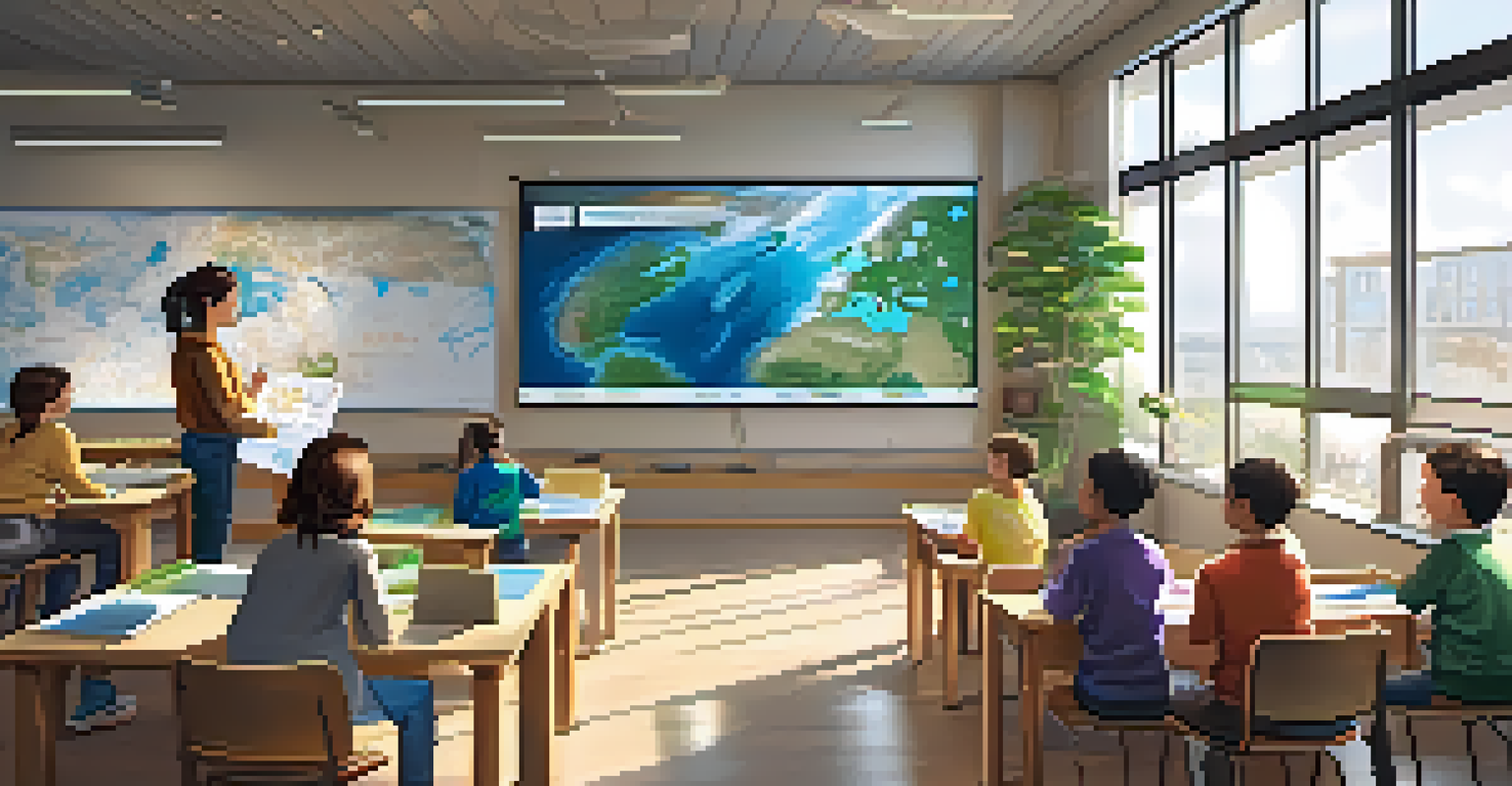The Impact of Global Issues on Local Community Learning

Understanding Global Issues and Local Implications
Global issues, such as climate change, economic inequality, and health crises, resonate deeply within local communities. These challenges are not just abstract concepts; they manifest in everyday life, affecting how communities learn and thrive. For instance, a town experiencing economic downturns may see reduced funding for schools, impacting educational quality.
Education is the most powerful weapon which you can use to change the world.
Moreover, local responses to these global challenges often shape community learning experiences. When a community faces environmental issues, local organizations may initiate educational programs focused on sustainability. This grassroots approach not only addresses the problem but also fosters a culture of active learning among residents.
The interconnectedness of global and local issues creates a unique learning environment. Community members become more aware of global trends and their local implications, prompting them to engage in discussions and initiatives that promote learning and growth.
Climate Change: A Catalyst for Community Education
The pressing issue of climate change has prompted local communities to rethink their educational strategies. Schools are increasingly incorporating environmental education into their curriculums, teaching students about sustainability and conservation. This shift not only raises awareness but also empowers future generations to tackle climate-related challenges.

Additionally, community workshops and local initiatives often emerge in response to climate change, fostering a collective learning experience. For example, a community garden project might encourage residents to learn about organic farming and food security. Such hands-on experiences are vital for deepening understanding and promoting sustainable practices.
Local Impact of Global Issues
Global challenges like climate change and economic inequality significantly influence local educational opportunities and community engagement.
Ultimately, climate change serves as a powerful motivator for learning, uniting communities in a shared mission. As residents become more informed about their environment, they are better equipped to advocate for policies that protect their local ecosystems.
Economic Inequality and Access to Education
Economic inequality is a significant global issue that influences local educational opportunities. In communities where financial resources are scarce, schools may struggle to provide essential services, leading to disparities in educational outcomes. This lack of access can hinder community learning and stifle potential.
The greatest threat to our planet is the belief that someone else will save it.
However, local responses to economic challenges can foster innovative educational initiatives. For instance, some communities establish scholarship programs or partnerships with local businesses to enhance educational access. By working together, they create pathways for students who might otherwise be left behind.
In this way, economic inequality becomes a catalyst for community-driven solutions. As residents rally to support education, they not only improve access but also cultivate a sense of solidarity and shared responsibility.
Health Crises: Shaping Learning Environments
Global health crises, such as pandemics, have a profound impact on local learning environments. The COVID-19 pandemic, for example, forced many schools to pivot to online learning, revealing both challenges and opportunities. Communities had to adapt quickly, showcasing their resilience and the importance of digital literacy.
In response to health crises, community organizations often step up to provide resources and support for learning. From offering mental health workshops to creating online tutoring programs, these initiatives help fill gaps left by traditional educational structures. This adaptability highlights the crucial role of community engagement in promoting effective learning.
Technology Enhances Community Learning
The use of technology empowers communities to stay informed, collaborate effectively, and respond to global issues with innovative local solutions.
As communities navigate health challenges, they also learn valuable lessons about collaboration and innovation. The experiences gained during such crises can lead to more robust and inclusive educational practices in the future.
Cultural Diversity: Enriching Community Learning
Globalization has brought cultural diversity to local communities, enriching the learning experience. Different cultural perspectives can enhance discussions and broaden understanding, fostering an inclusive environment where everyone feels valued. This cultural exchange is vital for preparing students to thrive in an interconnected world.
Local organizations often celebrate cultural diversity through events, workshops, and educational programs. For instance, a community festival might feature international cuisines, music, and art, providing hands-on learning opportunities for attendees. Such events not only celebrate diversity but also promote community cohesion.
By embracing cultural diversity, communities can create a vibrant learning ecosystem. This approach encourages empathy, respect, and a deeper appreciation for the complexities of global issues.
Technology's Role in Addressing Global Issues Locally
Technology has revolutionized the way communities learn about and respond to global issues. Online platforms provide access to a wealth of information, enabling residents to stay informed and engaged with pressing challenges. This democratization of knowledge is essential for fostering active citizenship and informed decision-making.
Moreover, technology facilitates collaboration among community members. For example, social media campaigns can raise awareness about local initiatives addressing global issues, such as recycling or food drives. By connecting people through digital channels, communities can mobilize resources and expertise more effectively.
Cultural Diversity Enriches Learning
Embracing cultural diversity within communities fosters inclusive learning experiences that prepare residents for an interconnected world.
As communities harness technology, they enhance their ability to learn from one another and share best practices. This interconnectedness ultimately leads to more robust solutions to local challenges shaped by global influences.
Empowering Local Leaders to Drive Community Learning
Local leaders play a crucial role in shaping community learning experiences, especially in the context of global issues. By fostering an environment of collaboration and open dialogue, these leaders can inspire residents to engage actively in addressing challenges. Their influence helps mobilize resources and creates a sense of shared purpose.
Leadership development programs can empower individuals to take on these roles, equipping them with the skills needed to drive change. For example, training workshops on advocacy and community organizing can prepare residents to tackle issues like climate change or economic inequality effectively. This empowerment fosters a culture of learning and action.

Ultimately, strong local leadership is vital for creating a resilient community. By encouraging participation and collaboration, leaders help ensure that learning remains at the forefront of community efforts to address global challenges.
The Future of Community Learning Amid Global Challenges
As global issues continue to evolve, so too will the landscape of community learning. The interplay between local experiences and global challenges will likely drive innovative educational approaches. Communities that embrace adaptability and collaboration will be better positioned to navigate these complexities.
Looking ahead, it’s crucial for local communities to prioritize inclusive and equitable learning opportunities. By fostering a culture of lifelong learning, they can prepare residents to face future challenges with resilience and creativity. This proactive approach will ensure that community learning remains relevant and impactful.
In conclusion, the impact of global issues on local community learning is profound and multifaceted. By recognizing the interconnectedness of these challenges, communities can cultivate an environment where learning thrives, ultimately leading to a brighter future for all.